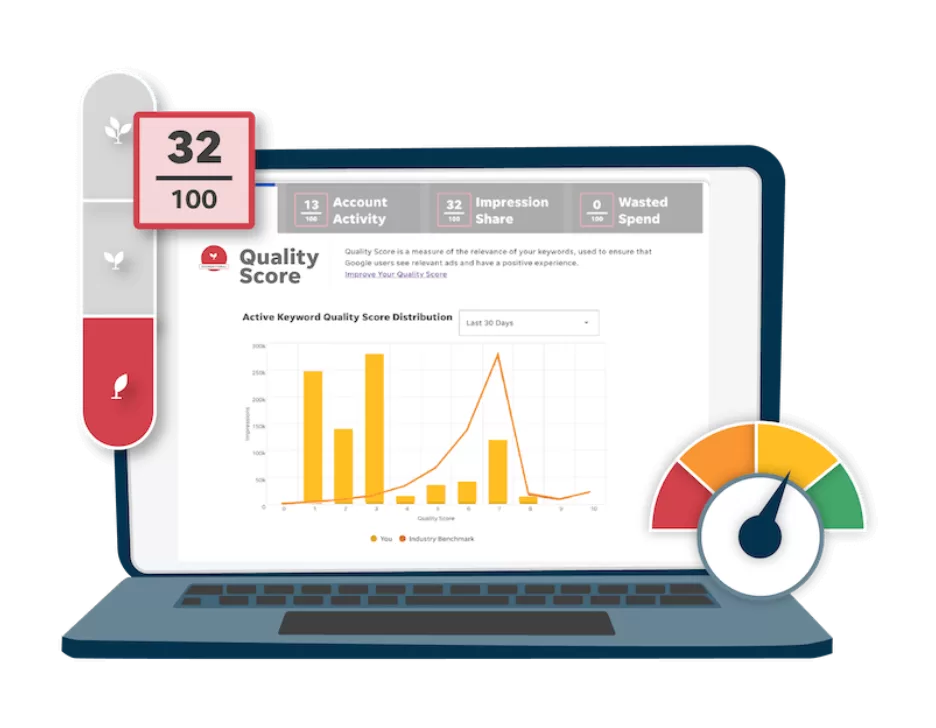Where’s the first place people go when they need an answer, idea, product, or service? Not to the Yellow Pages. Not into town. Not even to family and friends at this point. They go to Google. And most of them don’t scroll too far past the first few results.
This is why SEO, or search engine optimization, is a multi-billion dollar industry. SEO is the practice of getting a website to align with Google’s ranking factors, so your website content ranks higher and gets more traffic. So what are those ranking factors and how can you optimize your site for them? Read on to find out!
Contents
- What are Google ranking factors?
- Types of Google ranking factors
- On-page ranking factors
- Technical ranking factors
- Off-page ranking factors
What are Google ranking factors?
Google’s ranking factors are all the many variables and elements that Google takes into account when it chooses which web pages to rank for any given search. In other words, ranking factors are the things that affect whether you rank in Google for your desired keywords, and how high you rank.
SEO is the process of optimizing your website to rank as high as possible in organic search engine results (and yes, you can aim for the first page). When talking about search, we use the term “organic” to refer to search results that are unpaid. This is different from paid results, which come from PPC advertising.
Organic rankings on Google are determined by an algorithm that takes into account various characteristics and SEO metrics —and these are your ranking factors.
There are over 200 Google ranking factors, and while we will never know all of them, and they are always changing, we do know many. We also know that while ranking factors and algorithms may shift, some of the most important characteristics Google is looking for are experience, expertise, authority, and trust (E-E-A-T).
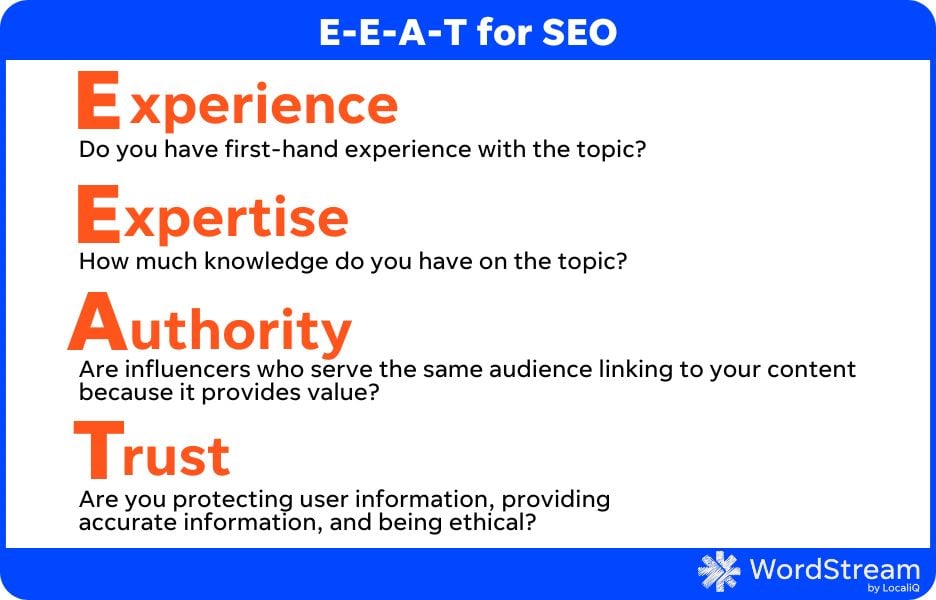
E-E-A-T is important for ranking on Google
Types of Google ranking factors
Before we get into the top 10 Google ranking factors around which you can optimize your website pages, let’s first go over the different types.
- On-page ranking factors refer to the content on the page itself, including keywords, images, and other elements users see on the page.
- Off-page ranking factors are factors outside the page itself, particularly links from other pages on your site or other websites (AKA backlinks).
- Technical ranking factors measure your site’s ability to be crawled, indexed, and render content quickly and safely for searchers.
- Local ranking factors involve all three of the above, with a special focus on reviews, reputation, and listings in a particular geographical location.
There isn’t one single ranking factor that will make or break your SEO. It’s the combination of all your technical, on-page, and off-page efforts that work together to help you rank higher on Google, get more traffic, and build trust.
⚡️ Find more ways to optimize your website to rank higher and get more traffic fast with our free guide on 25+ Ways to Get More Traffic to Your Website.
The top Google ranking factors, according to First Page Sage, include consistent publication of high-quality content, keywords in meta title tags, backlinks, niche expertise, user engagement, freshness, and trustworthiness:

Let’s dig into the most important ranking factors more deeply.
On-page Google ranking factors
The above technical search engine ranking factors have to do with your website as a whole, while these next ranking factors are more page-specific—hence the term on-page SEO.
1. Relevant, high-quality content
The single most important Google ranking factor is the quality of your content. This correlates to the consistent publication of high quality content, user engagement, and niche expertise in the chart above. So what makes relevant, quality content?
- It’s trustworthy. The information is in-depth, accurate, useful, and free of spammy links and/or comments.
- It’s readable. That means organized logically, written conversationally, and not stuffed with keywords (Google will actually penalize you for this). Incorporate it naturally into your page and use it interchangeably with related keywords.
- It’s fresh. Even the most evergreen content loses relevancy over time. So in addition to writing net new content, you should also be updating outdated pages with new information and new keywords that are relevant to today. This is the key to maintaining a good freshness score.
- It matches the intent of the keyword. In addition to using keyword research tools to find out what your ideal audience is searching online, make sure to search the keyword on Google itself to make sure you understand what users are seeking when they perform that search.
In a recent survey conducted by Directive, 78% of marketers identified keyword research as a high-impact practice for driving new traffic. The research process allows you to better understand what your audience is searching for and create content that directly addresses these search queries.
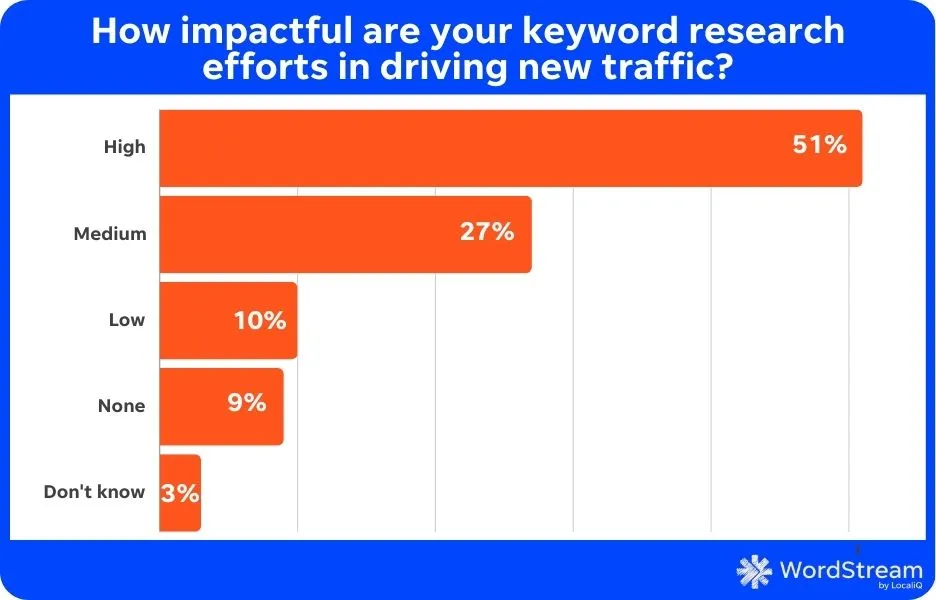
💡 Uncover more ways to rank higher on the SERP with our free guide to getting on the first page of Google.
2. Keyword placement
Once you know which keywords you want to rank for, it’s important to insert them into specific places on your page. This includes:
- Title tag: aka meta title; the title that appears on the SERP
- H1 title: title that appears on the page
- H2 headings: aim for at least two
- URL: keep your URL short and clean as well.
- Naturally in the body: and also in the first 100 words
- Meta description: the blurb that appears below the title tag/meta title. Make sure it accurately sums up your page and gives searchers a reason to click. Google doesn’t always use the meta description you provide, but it’s still important to include.

Keywords in the title tags are, by far, the most important, followed by H2s and URL.
3. Image optimization
This is an important one—not only because of Google image search but also because regular search results are getting more and more visual—especially on mobile. Here’s how to optimize your images for SEO:
- Assign alt text: This is the text alternative of an image, and the only way that Google can “see” them. Be short but descriptive and include the keyword. This also makes your website accessible to visually-impaired readers who rely on screen readers to browse the internet, and will show if the image fails to load.
- Compress and resize: Use an image compressor (tinypng is my favorite) to keep your image file sizes to 70-100KB or less if you can. Often, saving as JPG instead of PNG helps. Also, images rarely need to be more than 1,000px wide. Though a responsive website will resize the images automatically, the less requests your site needs to make to the server, the better for page speed.
- Add value: If you can, avoid using empty stock images and graphics in your blog posts and instead use screenshots, examples, charts, and illustrations that depict concepts. This improves the quality of the content and keeps users engaged longer.
- Include the keyword: Not just in the alt text, but the file name. And replace spaces with dashes in the file name, otherwise your CMS will replace them with “%20” which creates an untrustworthy-looking image link.
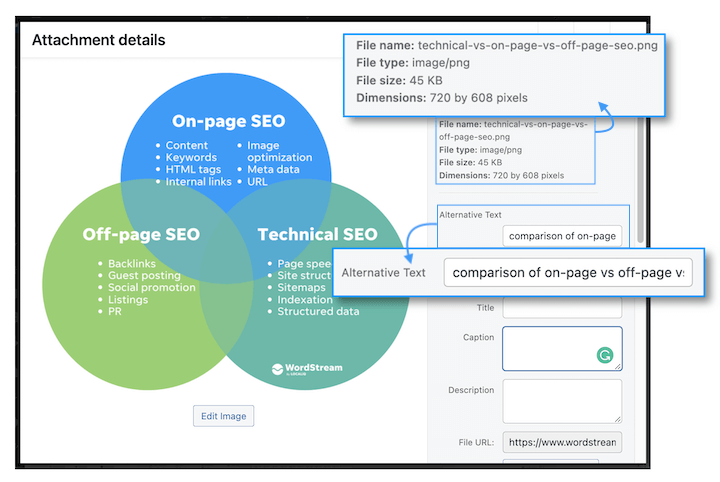
A properly saved, tagged, sized, and compressed image.
4. Niche expertise
It’s not just the quality of your content that indicates expertise in your niche, but also the quantity of that quality content. For example, WordStream has been publishing high-quality content about PPC for a long time now, so Google has come to see us as a trusted source in this niche. But if we were to publish a super high-quality post about, say, robotic process automation, our chances of ranking for that keyword are slim.
To build out your niche expertise, you can use the hub and spoke method (also known as pillar page and cluster content). With this method, you create a hub/pillar page on a particular topic, usually a broad, high-volume keyword. This serves as the main resource for that topic, and your various H2s cover different child keywords within that topic.
Then you have your spokes, or cluster content, which are the additional pages that dive deeper into each of the aspects (child keywords) covered in the pillar page.
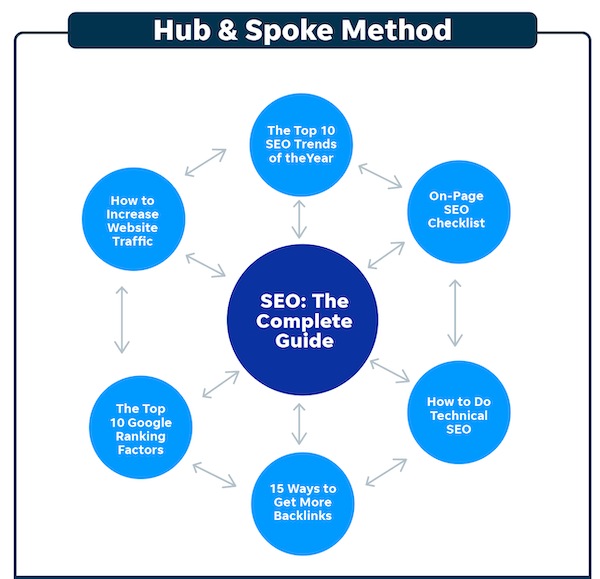
In addition to demonstrating your expertise within this niche, this method also helps with your site structure, which we’ll talk about later. Since the cluster pages link to and from the pillar content, as well as to each other, this keeps all of your links tightly organized around the same topic.
✅ Is your site optimized to rank on Google? Get an instant SEO audit with our free website grader.
Technical Google ranking factors
Since it involves knowledge of website structure and content management systems, technical SEO is commonly a joint effort between marketing and development teams. But although this may seem complicated, once your website is in good working order, there’s not a lot of ongoing maintenance required in terms of SEO. Here are the technical strategies for improving your rank:
5. Page speed
Users expect a pain-free browsing experience, which is why page speed is an important ranking factor. If your pages take too long to load, your bounce rate will increase and your ranking will decrease. You can check yours with GTmetrix or Google PageSpeed Insights.
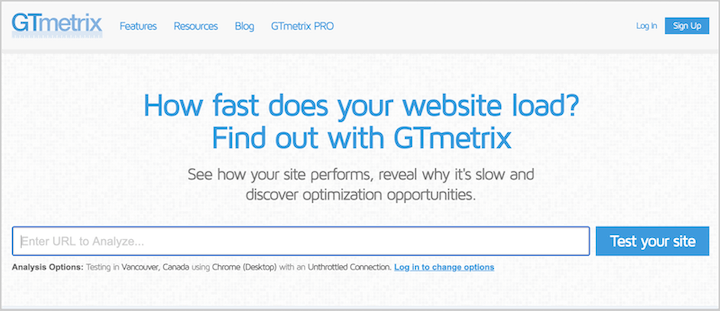
6. Mobile-friendliness
Back in 2019, Google told us it would be using mobile-first indexing on all new sites. This means that it makes its ranking assessment based on the mobile version of a site rather than the desktop. Then, in 2020 it told us plans for this to be the case for all sites, and all sites are now subject to mobile-first indexing.
In other words, even if the desktop version of your site is flawless, your search engine ranking could take a major hit if it isn’t optimized for mobile. Most content management systems allow you to make preview and adjustments for mobile/smaller screens. You can also use Google’s Mobile-Friendly Test.
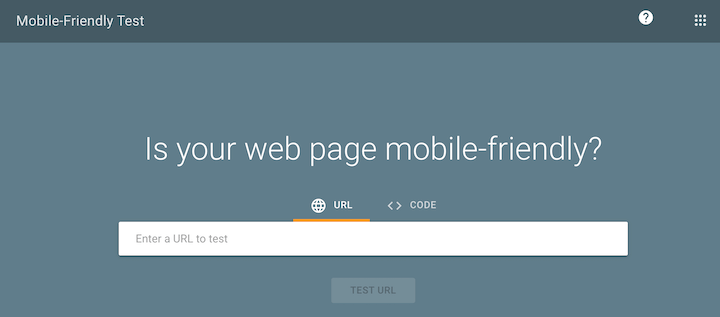
In addition to these tests, you should still always preview and test your web pages on an actual mobile device because there are some things that code just can’t pick up.
7. Core Web Vitals
While SEO trends ebb and flow, ranking factors don’t often change. But in 2021, Google did introduce a new ranking factor—Core Web Vitals—as a part of the page experience update. Core Web Vitals quantify a person’s experience on your page, which dictates whether and how they engage with it. They include:
- LCP (Largest Contentful Paint): how long it takes for the visible elements on a page to load.
- FID (First Input Delay): How long it takes for your page to register the first click or tap on the page.
- CLS (Cumulative Layout Shift): whether there are unexpected movements or disruptive popups
You can improve your Core Web Vitals with lazy loading, code minification, image compression, and more.
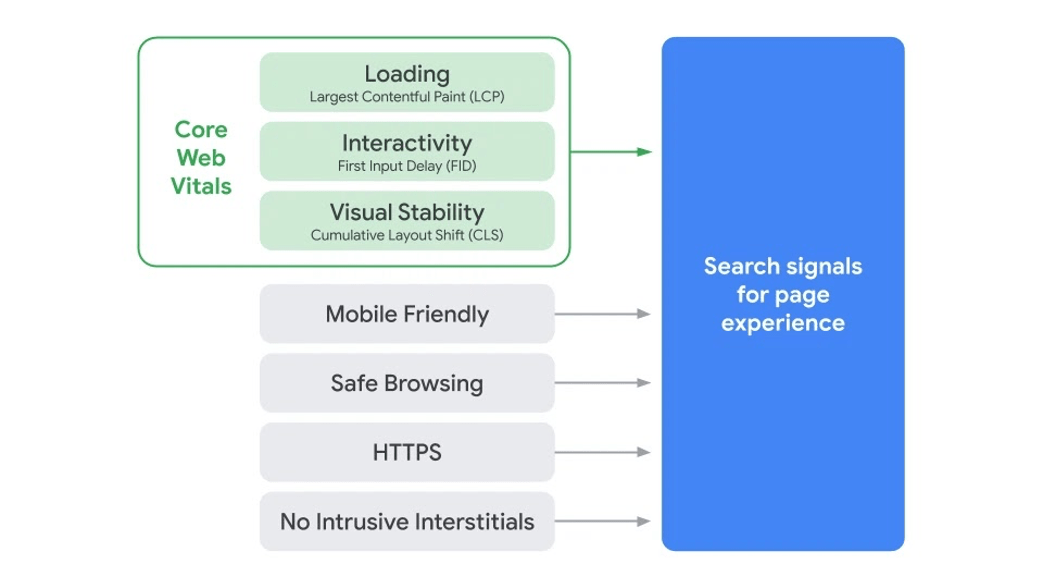
8. Website architecture
As mentioned earlier, search engines work by crawling and indexing different pieces of content on your website. Internal links refer to any hyperlink that points to another page on your same website. The more organized and tightly-knit your internal linking structure is, the more points of access you create to any given page, and the easier it is for search engines (and users) to find what they’re looking for.
Ideally, any given page on your site should be accessible in three clicks or less.
To do this, you must be mindful of what pages you’re linking to each time you create a new page or a new piece of content.
It makes it so that search engines can easily understand and index the content. Topic clusters are also beneficial from a user experience perspective. It makes your content easier to navigate and readers will realize that they don’t have to go to multiple sites to find what they’re looking for.
It’s likely that your website already undergoes regular maintenance to check for things like bugs or server errors. For SEO purposes, it’s a good idea to do a technical SEO audit of your site every couple of months to check for things such as 404 errors, redirect loops, and broken links.
9. Site security
Ever wonder what the s stands for in https (as opposed to just plain old http)? Well it stands for secure. And the way you get your site to be an https site rather than an http site is to get an SSL (secure sockets layer) certificate. There are a few different routes to getting an SSL, and the cost depends on the level of security you need as well as your hosting setup. HubSpot, for example offers free SSL through its CMS.
Off-page Google ranking factors
Off-page ranking factors have to do with entities outside of your website, such as social media platforms, influencers, and other websites, but there is one focal point to any off-page SEO strategy:
10. Backlinks
Last but most definitely not least, we have backlinks. A backlink is a link to your page that comes from another website. A page with a lot of links pointing back to it indicates to Google that the particular page is providing exceptional value, and is coming from a credible website. But one link from one quality domain is much better than multiple links from several low-authority websites.
So how do you get backlinks? Here are four link-building strategies.
- Original, quality content: If your content is high-quality, unique, and provides value to your audience, it will generate backlinks on its own. Go for the irreplicable content like thought leadership content and original data-driven pieces.
- Cold outreach: It takes years to build this kind of authority, so you’ll also want to build backlinks by finding related content and pitching your pieces to the author for a link.
- Guest posts: Another method for building backlinks is by guest blogging. Rather than just asking for a link, offer to write a post for that site. You can include a backlink to your site in the post or in your author bio.
The top 10 Google ranking factors [recap]
With a strong presence in both paid and organic search engine results, you can increase your visibility—and no matter what kind of business you run, having visibility on search engines is critical if you want to earn trust, build brand awareness, increase traffic to your site, attract customers, and drive revenue. The top 10 Google Ranking factors include:
- Quality content
- Keyword placement
- Image optimization
- URL structure
- Page speed
- Mobile-friendliness
- Core Web Vitals
- Site architecture
- Site security
- Backlinks
Just remember, when it comes to real SEO, there’s no such thing as a silver bullet. The most important note to keep in mind is that climbing the search results pages takes time. If you optimize your website for several ranking factors today, it’s not going to magically appear in the number one spot tomorrow.
The optimization process requires ongoing effort to keep your site as fresh and relevant for your audience as possible. As long as your website is functional and optimized with your target buyer in mind, you’ll start to see organic growth.
For more opportunities to optimize for Google’s ranking factors, follow our easy 10-step SEO audit, or you can use our free Website Grader tool to do it for you. Or, check out our full range of digital marketing solutions to learn how we can help with your SEO.

